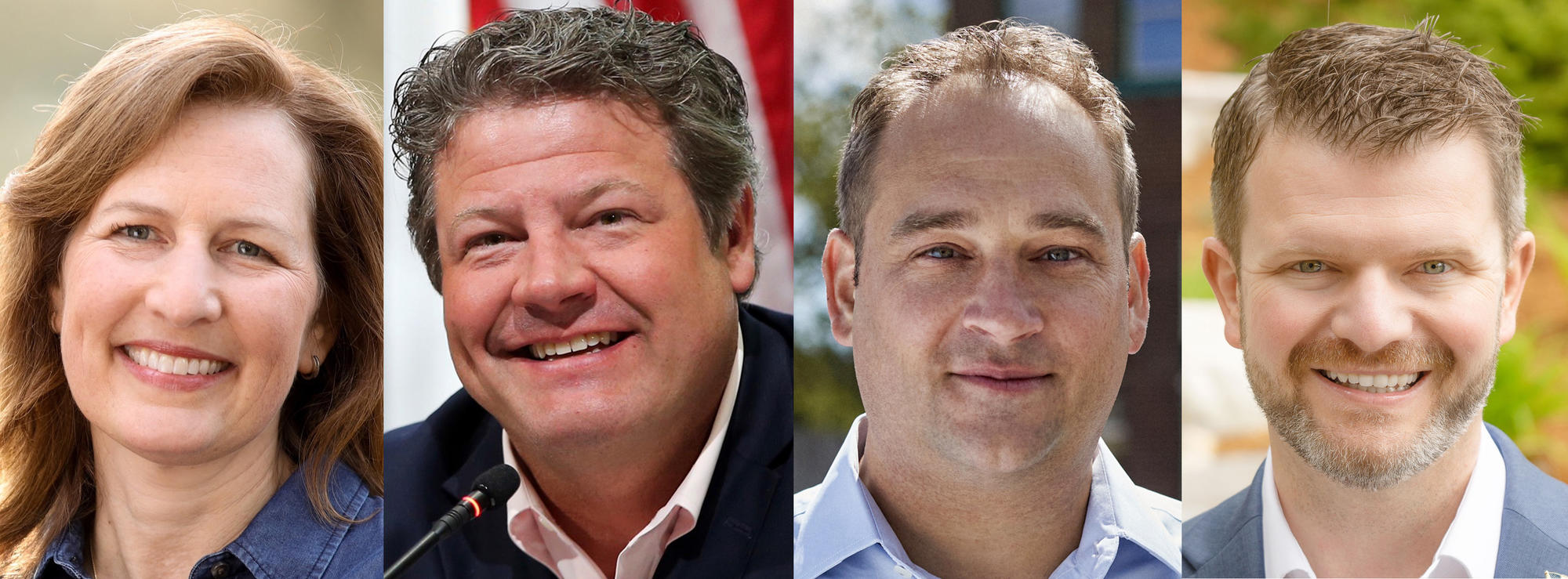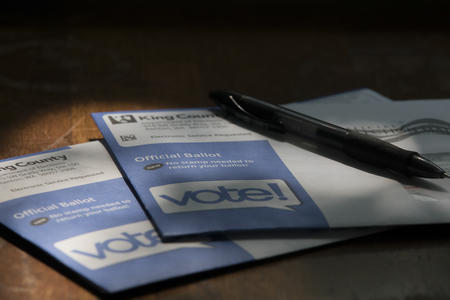Standing before about 30 people, Schrier made the case that defending her seat was necessary to prevent a Republican takeover of Congress that she contended could again move to gut a key federal health care law, go after Biden and push for broader abortion restrictions.
"We've got to hold the House, or we can anticipate what they have told us," she told the crowd. "They told us they will impeach the president ... they will undo the Affordable Care Act that we fought so hard to keep, and now there's talk of a national ban on abortion."
It’s now the third consecutive election cycle in the spotlight for Schrier and the 8th District, which straddles both sides of the Cascade Mountains and is one of just a handful of competitive races in the 435-member U.S. House of Representatives. The district includes eastern King, Pierce and Snohomish counties, as well as Chelan and Kittitas counties.
Voters first elected Schrier, a pediatrician from Sammamish, in 2018, in a blue wave that saw Democrats retake the House and serve as a check on Republicans and then-President Donald Trump.
Now, it’s the GOP that sees a chance to regain control of the House, as President Joe Biden’s poll numbers sag and Republicans assail Democrats over crime and rising costs for food, housing and gasoline.
While 10 challengers are on the primary ballot, only three – all Republicans – are raising the money needed to run a high-profile congressional campaign against the congresswoman. For Washington voters who study their ballots, their names will be familiar:
There’s Jesse Jensen, a veteran and manager in the tech industry who ran against Schrier in 2020, losing by about 4% of the vote.
There’s Matt Larkin, who works for the manufacturing company owned by his family and who in 2020 ran unsuccessfully against Attorney General Bob Ferguson.
And there’s longtime King County Councilmember Reagan Dunn, a more moderate Republican and son of Jennifer Dunn, who held the 8th District congressional seat from 1993 to 2005.
With no other serious Democratic competition on the ballot, Schrier is expected to clear the Aug. 2 primary, which will advance the top two vote getters on to November. Her campaign has nearly $5 million on hand.
Schrier’s record in Congress
In an interview, Schrier touted her efforts to tamp down on rising costs, like a bill she sponsored intended to stop price-gouging by oil companies and legislation intended to strengthen the supply chain in the agriculture sector. Both bills passed the House in recent months.
She plays up her bipartisanship, such as a bill she wrote with U.S. Rep. Dan Newhouse, R-Sunnyside, that expands federal water projects in the Yakima basin and boosts funding for Native American irrigation projects. Trump signed the legislation into law in 2019.
And she pointed to the new right-leaning Supreme Court’s overturning of Roe v. Wade, the federal protection of abortion, as another reason why voters should return her to office.
“I'm the only pro-choice woman doctor in Congress, the first pediatrician ever in Congress, so I have this special role to fill,” she said. “Whether it's for women, for families, for children.”
On public safety, Schrier said she’s never supported the movement to defund the police. She wants to boost spending on law enforcement tools and training, she said, “and we’ve got to do that to keep our communities safe and keep them safe.”
Reagan Dunn
First elected to the King County Council in 2005, Dunn worked previously as a federal prosecutor and as an appointee to the U.S. Department of Justice under President George W. Bush. He has raised $605,000 and has about $466,000 on hand.
To tackle crime, Dunn, 51, calls for more dollars for both law enforcement and to strengthen the federal government’s gun-purchase background check system. He also thinks the government should find more ways to crack down on straw purchases – where somebody buys a gun for another person.
But, “I think it's a mistake to assume that more gun control leads to less crime,” he said. “Washington has some of the most restrictive guns laws in the country, and crime has skyrocketed.”
Like the other Republicans in the race, Dunn criticized Schrier’s vote for the American Rescue Plan, the $1.9 trillion federal coronavirus aid package, which he blamed for helping spur inflation.
He is running to “take the credit card away from Kim Schrier and give it to somebody who has a proven record” of fiscal discipline, Dunn, who lives in Covington, said.
And Dunn – who got a DUI in 2014 and had a relapse in 2017 – is speaking openly about substance use disorder.
“I haven't lived a perfect life, I'm not pretending I have, I believe failure doesn't come from falling down, I believe it comes from not getting back up,” Dunn, who said he has been sober since late 2017, said. If elected, he vowed to be “the leading Republican” in Congress “focused on substance abuse policy.”
On abortion, Dunn said that he supports Washington’s current law allowing it and doesn’t believe government should have the power to stop abortion, though he does not favor government dollars going to such procedures.
“I don't see anything in the Constitution that says the federal government has the right to decide abortion,” he said, adding: "I don't want an East Coast-centric Supreme Court or politicians in Georgia or Alabama" telling Pacific Northwesterners what to do.
Jesse Jensen
Voters in the 8th District may remember Jensen, a 39-year-old software worker and veteran with four tours of duty – including a year in Afghanistan – who ran against Schrier two years ago. This cycle, Jensen has raised about $816,000, and has about $425,000 on hand.
He described Schrier as out of touch with the district, pointing to her violation of a federal law that members of Congress quickly disclose large purchases of stocks.
In that instance, the congresswoman and her husband bought up to $1 million of stock in Apple last July, according to The Seattle Times, but didn’t disclose the purchase until November, more than two months after the law’s legal deadline.
“I don't know about you, but I don't have $1 million in my bank account,” said Jensen, who lives in Bonney Lake.
Schrier’s husband made the purchase last year and “there was an oversight in not filing the paperwork,” according to her campaign spokesperson. “As soon as Rep. Schrier found out, they corrected the error.”
To address inflation and future energy costs, Jensen vowed to support legislation by U.S. Rep. Cathy McMorris Rodgers, R-Spokane, that seeks to boost energy independence. That proposal would among other things restart gas and oil leasing on federal lands and immediately approve the Keystone XL pipeline.
Jensen vowed to strengthen public safety by pushing to increase the use of body cameras, and, more broadly, “I would make sure that we are funding the police, giving them the tools that they need.”
A Protestant whose father was a Presbyterian pastor, Jensen said he is anti-abortion. He was noncommittal about a federal ban on abortion, saying, “I don't want to get too far in on hypotheticals, I would want to understand the text of the legislation.”
Jensen contended he’s the most electable Republican in the race, in part because he already ran a close race against Schrier – and noted that one of his primary competitors doesn’t even live in the district.
Matt Larkin
Larkin, the former attorney general candidate, indeed lives just outside the district in a Woodinville home he’s lived in for a dozen years, he said.
That’s neither unlawful, nor unheard of: Voters in 2016 elected U.S. Rep. Pramila Jayapal, D-Seattle, when she lived just outside the 7th Congressional District.
Larkin is legal counsel for his family’s business, Bothell-based Romac Industries, which makes components for water pipes. Like Dunn, he had a stint in the Bush administration, as a speechwriter. He vowed to be a fiscal conservative: “We've got to stop spending, stop printing money.”
Other than inflation, Larkin cited a litany of troubles that he saw as getting worse: crime, homelessness and drug use.
Touting himself as the most conservative candidate in the race who can win, Larkin has used the slogan “Make Crime Illegal Again” and wants to close the nation’s southern border in an attempt to slow the inflow of narcotics.
On abortion, Larkin said he is pro-life – “and we've got four kids to prove it” – and that the Supreme Court’s decision in Dobbs v. Jackson Women’s Health was sound.
“I think that Dobbs really was correct to kick it back to the states,” Larkin, 40, said. He has raised about $630,000 total, and has $355,000 on hand.




